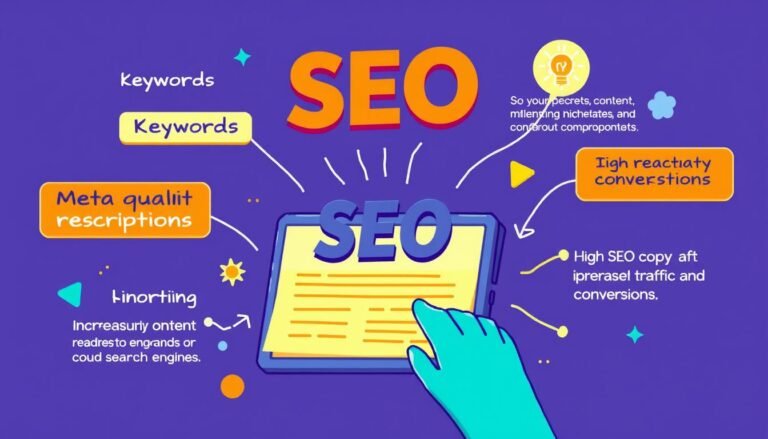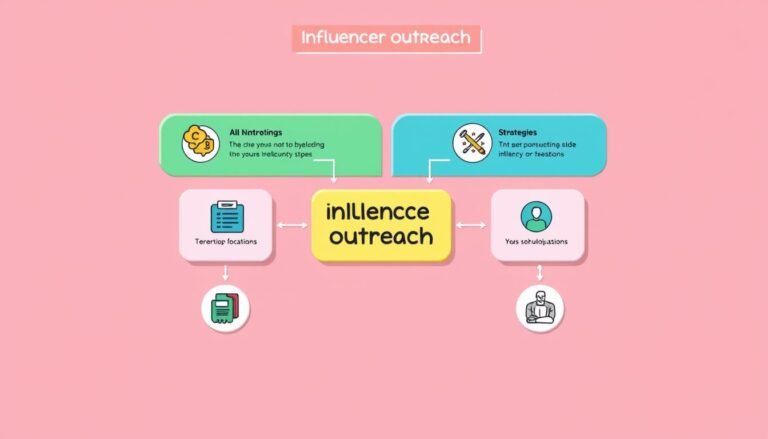How to Use Machine Learning in Marketing
Did you know 51% of marketers use Artificial Intelligence in their plans? This shows how big a deal machine learning is in marketing. It’s not just a trend; it’s a key change in how brands connect with people. Machine learning lets systems and apps learn from lots of data. This helps marketers find important insights and automate tasks better than ever.
This guide will show you how to use machine learning in marketing. We’ll cover how to use AI in marketing strategies. Machine learning helps with better customer groups and improving campaign results. It cuts through data noise and finds key insights. Join us to see how machine learning changes modern marketing.
Key Takeaways
- Machine learning automates data analysis and marketing tasks.
- Over half of marketers are currently leveraging AI in their strategies.
- Customer segmentation is greatly enhanced through machine learning algorithms.
- Predictive analytics empowers brands to tailor personalized marketing campaigns.
- Automation tools can vastly improve customer service experiences.
Understanding Machine Learning and Its Relevance in Marketing
Machine learning is a key part of artificial intelligence. It lets systems learn from data and get better over time without needing to be programmed. This tech has changed how we market today, giving us tools to make decisions based on data.
By using the internet’s vast resources, machine learning helps marketers make their strategies better. It’s like having a super smart assistant that gets better with time.
Definition of Machine Learning
Machine learning lets computers look at data, find patterns, and predict what might happen next. This means it can change its ways based on new data. This is super useful in today’s digital world, which is getting bigger and bigger.
By 2020, the digital world was set to grow from 130 exabytes to 40,000 exabytes. That’s a huge increase, showing how important it is to handle data well.
The Role of AI in Marketing
AI in marketing makes things better for customers. It looks at how people act and gives insights for making things more personal. But, machines can’t replace human creativity. They’re good at finding patterns, but they don’t have the same creative spark.
Marketers can use AI to spot trends and make smart choices. This way, they can keep their campaigns creative and effective.
Benefits of Machine Learning in Marketing Strategies
Machine learning has many benefits for marketing strategies. These include:
- Increased efficiency: It automates boring tasks, saving marketers time.
- Better targeting: It looks at what customers like, helping to focus on the right people.
- Enhanced performance: It uses predictions to understand what customers might do next, making campaigns better.
Using machine learning means marketing can be more personal. It looks at each customer’s data to give them what they want. Businesses can quickly go through huge amounts of data, finding things that might not be obvious to people.
This tech not only makes things more efficient but also gives businesses an edge. It helps them make smarter marketing moves.
| Benefit | Description |
|---|---|
| Efficiency | Reduces time spent on repetitive tasks like data analysis. |
| Targeting | Creates more precise audience segments based on behavior and preferences. |
| Performance | Improves campaign effectiveness through data-informed decisions. |
| Personalization | Delivers tailored content and recommendations to enhance customer engagement. |
How to Use Machine Learning in Marketing
To use machine learning in marketing well, companies need to focus on integrating ML algorithms. These algorithms help make data-driven decisions. This lets companies look at big customer datasets, find trends in consumer behavior, and make marketing strategies better.
Integrating ML Algorithms for Data-Driven Decisions
Machine learning helps marketers sort customers well and make campaigns more personal. By using algorithms, companies can find potential leads automatically and make content fit what users like. This makes marketing more precise, helping brands connect better with customers.
For example, JPMorgan Chase uses AI to make marketing content just for customers, which helps keep customers interested.
Identifying Key Marketing Areas for Implementation
Finding the right marketing areas for implementation is key to getting the most from machine learning. Important areas include looking at customer groups, predicting what will happen, and making campaigns more personal. Companies like Stitch Fix use data science to manage their inventory better, and Sephora uses chatbots to help customers more.
Using machine learning can really boost how happy customers are and how well marketing works.
Enhancing Customer Segmentation with Machine Learning
Customer segmentation is key to marketing success. It helps businesses understand their audience better. Machine learning makes this process easier and more efficient. It looks at big datasets to find patterns for targeted marketing.
Automating Customer Segmentation Processes
Automating customer segmentation gives a big boost over old ways. Companies using machine learning can quickly go through lots of data. They spot geographic, demographic, behavioral, and psychological traits.
About 63% of digital marketing leaders struggle with making experiences personal. Automating customer segmentation helps a lot in making strategies fit better.
Benefits of Hyper-Segmentation
Hyper-segmentation takes customer segmentation further. It finds specific groups within groups for super-personal marketing. For example, Capital One used machine learning to find out what their best customers are like.
This focus on detail makes customer experiences better and increases revenue. Machine learning helps find the right customer groups. It uses supervised and unsupervised learning to improve segmentation.
Unsupervised learning, with methods like K Means and Hidden Markov Model, groups different customers well. This shows how automating customer segmentation is really beneficial.
Using Predictive Analytics in Marketing
Predictive analytics in marketing helps businesses make better strategies and connect with customers better. By using predictive models, companies can understand what customers might do next. This leads to smarter decisions.
Applying Predictive Models for Better Strategies
Marketers have a lot of data on customers, like who they are, what they buy, and how they act online. By looking at this data, companies can spot trends and predict what will happen next. This helps shape their marketing plans for the future.
This method goes beyond just looking at who customers are. It looks at what they do and what they might do next. So, companies can make content just for each customer and know the best time to reach them.
Machine Learning for Churn Prediction and Lead Scoring
Knowing which customers might leave is key to keeping them happy. By spotting when customers start to lose interest, companies can try to win them back. This helps keep customers and saves money.
At the same time, machine learning helps score leads so marketers can focus on the best ones. This means sales teams work on leads that are most likely to become customers. It makes sales better and helps use marketing money wisely.
| Aspect | Predictive Analytics Impact |
|---|---|
| Churn Prediction | Identifies at-risk customers and enables proactive engagement. |
| Lead Scoring | Prioritizes leads, increasing chances of conversion and sales. |
| Data Utilization | Incorporates vast customer data to inform strategies. |
| Personalization | Delivers tailored messages based on customer preferences and behaviors. |
| Market Insights | Forecasts trends, allowing businesses to adapt strategies for new opportunities. |
Demystifying Automated Marketing Techniques
Businesses today need to understand automated marketing techniques to keep up with the digital world. Using AI to automate campaigns makes marketing better and more effective. This part looks at how automation changes marketing and shows how it works in real life.
AI-Driven Campaign Automation
AI changes marketing by making quick decisions based on what customers do. It uses smart algorithms to understand data and predict what will happen next. This means marketing can be more precise and personal, building strong customer relationships.
Improving Efficiency through Marketing Automation
Marketing automation makes routine tasks easier, giving marketers more time for big ideas. By adding data analysis to campaigns, businesses get more consistent and accurate results. Automation cuts down on mistakes and makes answers faster, making marketing better.
Real-World Examples of Automation Success
Many companies are showing how well automated marketing works. Netflix and Spotify use smart algorithms to give users content they like. This approach boosts user interest and increases sales, setting a high bar for others.
| Company | Strategy Used | Results |
|---|---|---|
| Netflix | Personalized recommendations | Higher user engagement rates |
| Spotify | Tailored playlists | Increased subscriber conversions |
| Hyundai Marine and Fire Insurance | Broad match with Smart Bidding | 55% growth in online sales, 16% increase in conversions |
Using these automated marketing methods puts businesses ahead in the market. As they deal with complex data and use AI, they can see big improvements in their marketing.
Optimizing Marketing Performance with Machine Learning
Many businesses aim to boost their marketing performance today. Using machine learning helps them do just that by analyzing data better. This tech lets marketers look at lots of customer data to find groups with similar traits.
Improving Campaign ROI through Data Analysis
Optimizing marketing performance means knowing what makes investments pay off. Machine learning gives insights into how to set bids in ads. It adjusts in real-time based on how people act, making sure money is used well.
- Machine learning makes ads more personal, showing ads that match what users like.
- Tools like Google Analytics and Google Tag Manager help manage the data needed for machine learning.
- Companies use platforms like TensorFlow and Adobe Sensei to understand what customers do and predict what they might do next.
Measuring Predictive Analytics Success
It’s key to know how to measure predictive analytics to make marketing better. Businesses need strong metrics and KPIs to see if their predictive models work. By updating these algorithms with new feedback, marketers can keep up with changing customer habits.
Big names like Amazon and Spotify show how well machine learning works in ads. They target their audiences better and engage with them more. By focusing on quality data and smart algorithms, companies can really benefit from machine learning and stand out in the market.
Conclusion
Using machine learning in marketing is more than a trend; it’s a game-changer. It helps marketers use advanced tech for better customer groups, predicting sales, and automating campaigns. Companies like Netflix and Airbnb have seen big savings and revenue growth by using machine learning.
The digital world is always changing, making it key for businesses to keep up with machine learning insights. For example, Spotify uses predictive models to keep customers coming back. And let’s not forget Twitter’s AI for better content and user experience. These stories show why adapting to new tech is crucial.
Learning how to use machine learning in marketing is about leading, not just keeping up. By adopting machine learning, marketers can find new economic chances and see a strong return on investment. This leads to ongoing growth and happier customers.
Source Links
- Machine Learning in Marketing: A Complete Guide | Mailchimp
- 10 Ways to Use Machine Learning for Marketing in 2024
- This is a Machine Learning Introduction
- Impact Of Machine Learning On Marketing Analytics
- How Machine Learning Can Be Used in Marketing
- Council Post: Introduction To Machine Learning For Marketing
- Machine-Learning Marketing: How Loomi Can Accurately Predict the Perfect Campaign
- How Machine Learning in B2B Marketing Helps Businesses
- How to Use Machine Learning for Customer Segmentation
- How to use machine learning for customer segmentation | Whites Agency
- Predictive Analytics For Marketing Teams
- What Is Predictive Analytics in Marketing and How Can It Help in 2024?
- Demystifying Algorithmic Marketing Strategies for 2024
- Marketing automation: AI and machine learning – Think with Google APAC
- Transforming Your Digital Marketing Strategy with AI
- Machine learning in the optimization of advertising campaigns
- What are the best machine learning tools for performance marketing optimization?
- 13 Examples of Machine Learning for Marketing
- Machine learning and artificial intelligence use in marketing: a general taxonomy – Italian Journal of Marketing








